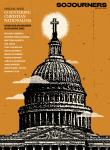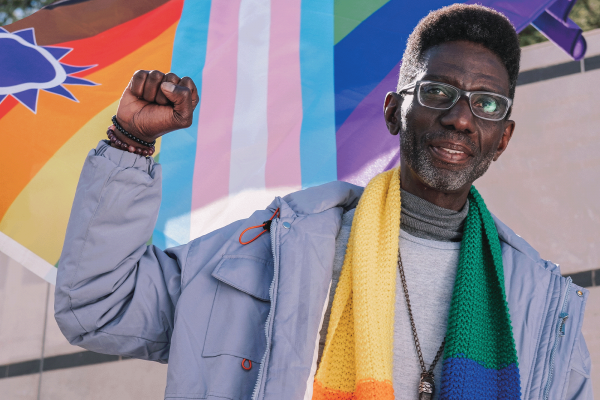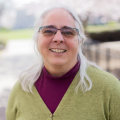WITH HIS 78-YEAR-OLD mother in court watching and praying, Friedel Dausab calmly waited for the judges’ decision. Would Namibia’s post-colonial Constitution uphold human dignity for gay men, or would it cling to apartheid-era Calvinist laws that criminalized same-sex conduct?
Dausab, a born-again Christian, was raised in a deeply religious family. His faith undergirds his 25 years of service and advocacy for those living with HIV/AIDS. His work culminated most recently in Namibia’s landmark legal decision in June to decriminalize gay sex. Dausab was the primary litigant.
I spoke with Dausab to learn more. His testimony of faith holds strands of God’s work in history.
Dausab was born in the early 1970s on a farm in a region governed by apartheid South Africa. His earliest memory of Jesus was from a book of Bible stories for children that his mom, Magdalena, read to him in Afrikaans. In 1990 his country gained independence, founding a free Namibia. As a teenager, he came out as “a gay boy” to his mom, a missionary for the Evangelical Lutheran Church in Namibia. Then, in his mid-20s, he gave her terrible news: He was HIV-positive.
At the time, HIV was the leading cause of death in Namibia. Dausab’s diagnosis propelled him to respond to the HIV/AIDS epidemic.
“Over time,” Dausab said, “I realized we were making good progress, but I was not seeing the most marginalized people, people like me, getting equitable service.”
Before a legal challenge to the colonial discriminatory laws could be raised, the new government had to admit that gay Namibians existed. Even with Dausab sitting at the table, officials said, “We don’t have them. What are you talking about?” He collaborated on a three-country study to provide the first data on the prevalence of gay men in his region.
He learned how acutely the sodomy laws impacted the HIV epidemic and the lives of individual men. They were deeply lonely, lacked language to describe their sickness, and were rejected by their families and church. Often, gay men were pressured into “pretend marriages,” which increased disease transmission. “I realized that these laws had to go,” Dausab told me. “All of a sudden we were dealing with a different mission.”
I asked Dausab what it was like in the courtroom when the final verdict was read after more than three years in legal proceedings. “I couldn’t believe my ears. There were serious security measures that day. Both my mom and I had a bodyguard. But also, the High Court judge was speaking so softly. Then I realized I was hearing the words ‘unconstitutional and invalid.’ That’s when I knew it was done; that we had won. The law would no longer be used as a noose around the necks of gay men.”
Dausab’s journey is a response to Christ’s call. He first met Jesus in those childhood Bible bedtime stories. “I didn’t meet someone who was ‘spiritual’ or a ‘church leader.’ Instead, I met a human rights fighter. I met one who looked after the marginalized. ... who was able to talk to sex workers, to those accused of adultery. He was able to stand as a protective force between them and a society and system that would have them killed,” Dausab said.
“Seeing my work as mission, as not just coming from me, makes it easier,” Dausab told me. “When I get to the difficult parts of any given job, I go back to the Person who gave me the mission in the first place. I know that most of my fight will be on my knees.”

Got something to say about what you're reading? We value your feedback!







